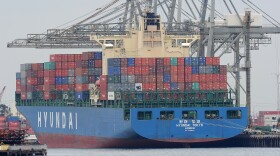
Marilyn Geewax
Marilyn Geewax is a contributor to NPR.
Before leaving NPR, she served as senior business news editor, assigning and editing stories for radio. In that role she also wrote and edited for the NPR web site, and regularly discussed economic issues on the mid-day show Here & Now from NPR and WBUR. Following the 2016 presidential election, she coordinated coverage of the Trump family business interests.
Before joining NPR in 2008, Geewax served as the national economics correspondent for Cox °µºÚ±¬ÁÏpapers' Washington Bureau. Before that, she worked at Cox's flagship paper, the Atlanta Journal-Constitution, first as a business reporter and then as a columnist and editorial board member. She got her start as a business reporter for the Akron Beacon Journal.
Over the years, she has filed news stories from China, Japan, South Africa, and Europe. She helped edit coverage for NPR that won the Edward R. Murrow Award and Heywood Broun Award.
Geewax was a Nieman Fellow at Harvard, where she studied economics and international relations. She earned a master's degree at Georgetown University, focusing on international economic affairs, and has a bachelor's degree from The Ohio State University.
She is the former vice chair of the National Press Club's Board of Governors, and currently serves on the board of the Society of American Business Editors and Writers.
-
President-elect Trump has interests in hundreds of businesses. Many government agencies and policies could affect his profits. Here's a look at some of his businesses, and the possible conflicts.
-
President-elect Donald Trump must quickly fill government departments with leaders who can help give shape to his economic vision. His transition team is considering a number of candidates.
-
Investors who had been showing fear in recent weeks at the prospect of a Donald Trump presidency drove down equities, currencies and Treasurys as the election results became clear.
-
This year's unconventional presidential race has some stock analysts worried about unpredictable markets. NPR's Marilyn Geewax talks about why and how politics are roiling the financial markets.
-
The Labor Department's latest jobs report shows that average hourly earnings have risen by 2.8 percent since last year, outpacing inflation. Economists say that will boost consumer spending.
-
In recent weeks, U.S. corporations have announced multibillion-dollar deals in a huge wave of mergers. Economists say that can hurt consumers, workers and savers — but also strengthen the economy.
-
If it shows steady unemployment and job growth figures, that would help Democrat Hillary Clinton. If the numbers get worse, that would give an edge to Republican Donald Trump.
-
The 1990-91 recession was catastrophic for Donald Trump's empire. A tax document published by The New York Times shows as late as 1995, he was reporting an annual loss of $916 million. What happened?
-
Candidates are talking about taxes and trade, but not about the tsunami: the massive wave of automation that will transform the workplace.
-
Americans shared their views on trade with NPR and member stations. One thing is clear: Millions of voters have deep feelings about trade — and often are at odds with each other about it.










